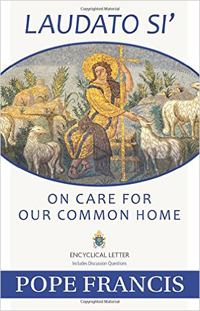 Pope Francis, Laudato Si': On Care for Our Common Home (Huntington, IN: Our Sunday Visitor Publishing Division, 2015), 176pp.
Pope Francis, Laudato Si': On Care for Our Common Home (Huntington, IN: Our Sunday Visitor Publishing Division, 2015), 176pp.
This second encyclical by Pope Francis takes its title from The Canticle of the Creatures by his namesake Francis of Assisi, who wrote, "Laudato Si', mi' Signore —" Praise to you, my Lord, through our Sister, Mother Earth, who sustains and governs us, and who produces various fruit with colored flowers and herbs." But our sister now cries out to us because of the violence we have done to her in our "irresponsible use and abuse of the goods with which God has endowed her."
By now the list is long and well known — climate change, depletion of non-renewable resources, the loss of biodiversity, and a growing gap between the minority rich who are addicted to "compulsive consumerism," and the poor, who can't possibly consume like we do, even were it possible. Our current situation cannot be universalized or sustained.
We've succumbed to the "modern myth of unlimited material progress," to the alluring power of the "technocratic paradigm," the numbing of conscience, and an economic model that maximizes profits without any greater end in view. But we now know, or we ought to know, that technological progress and economic growth do not guarantee human welfare.
What we need most is a change in our own selves. That begins, says Pope Francis, with realizing that "humanity is one people living in a common home." "It cannot be emphasized enough how everything is interconnected." We can no longer make choices or policies that defend the interests of only a few countries, or even the few within a single country. "We need to strengthen the conviction," he says, "that we are one single human family." The earth is our "collective good." Indeed, "this sense of fraternity excludes nothing and no one."
Pope Francis addresses his encyclical to "all people of good will," but he has special counsel for Christians. What we need is an "ecological conversion," whereby "the effects of our encounter with Jesus Christ become evident in our relationship with the world around us. Living our vocation to be protectors of God's handiwork is essential to a life of virtue; it is not an optional or a secondary aspect of our Christian experience" (my emphasis).


